Has your cat eaten plastic? Don’t panic! I’ll guide you through immediate steps to be taken and potential health concerns.
Key Takeaways:
- Cats ingesting plastic can face immediate health concerns.
- Plastic ingestion can lead to suffocation, strangling risks, and gastrointestinal blockages.
- Vomiting, altered stools, decreased appetite, and abdominal pain are common signs of plastic ingestion in cats.
- If your cat ate plastic, prevent further consumption, monitor the situation, and contact a veterinarian.
- Seek prompt veterinary care to ensure the best outcome for your cat.
When a cat consumes plastic, it poses various dangers to their health. Suffocation, strangling risks, and gastrointestinal blockages are some potential consequences. Additionally, plastic wrap is especially hazardous as it cannot be digested and may cause blockages in the digestive system.
Signs that your cat may have eaten plastic include vomiting, altered stools, decreased appetite, lethargy, and abdominal pain. If you suspect your cat has ingested plastic, it is crucial to take immediate action.
Firstly, prevent your cat from consuming any more plastic. Then, carefully observe and monitor their condition. It is essential to contact a veterinarian for further guidance and advice.
A veterinary examination is important to assess any potential damage to your cat’s organs. The outcome for a cat that has eaten plastic depends on factors such as the size and type of plastic consumed. Seeking prompt veterinary care can significantly improve the chances of a positive outcome.
Preventing future incidents of plastic ingestion involves storing plastics safely and providing your cat with appropriate toys and playtime to keep them engaged and satisfied.
In some cases, plastic ingestion may come with the risk of potential toxicity. It is recommended to have your cat’s liver and kidneys checked for any signs of toxicity.
Remember, if your cat has eaten plastic, it is essential to take immediate action and seek veterinary care to ensure their health and well-being.
Recognizing the Dangers of Cats Ingesting Plastic
When a cat eats plastic, it can lead to various health concerns, including choking hazards, intestinal blockages, and potential toxicity. These dangers highlight the importance of understanding the risks associated with plastic ingestion in cats and being able to recognize the symptoms that may indicate plastic ingestion. By being aware of these dangers, cat owners can take immediate action to help their feline companions and prevent further complications.
“Plastic ingestion in cats can have serious consequences for their health. As a responsible pet owner, it is crucial to be aware of the potential dangers and act promptly if you suspect your cat has eaten plastic.
One of the primary dangers of cats ingesting plastic is the risk of choking or suffocation. Plastic materials can easily obstruct the airways, leading to respiratory distress and potentially fatal consequences. These choking hazards can occur when cats chew on plastic objects or accidentally swallow small pieces of plastic.
Recognizing the Symptoms of Plastic Ingestion
In addition to choking hazards, plastic ingestion can result in intestinal blockages. When cats eat plastic, it can cause the material to collect in their digestive tract, leading to blockages and severe discomfort. Common symptoms of plastic ingestion in cats include vomiting, altered stools, decreased appetite, lethargy, and abdominal pain. If you notice any of these signs in your cat, it is crucial to seek veterinary attention immediately.
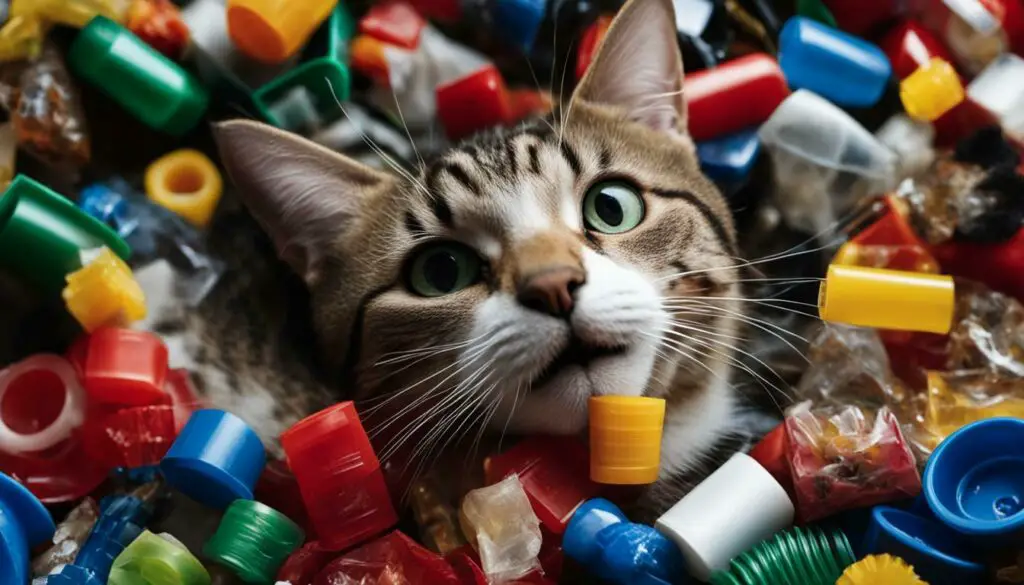
Furthermore, the potential toxicity associated with plastic ingestion is another significant concern. Cats may ingest harmful substances along with the plastic, leading to potential liver and kidney damage. Therefore, it is important to have the cat’s liver and kidneys checked for potential toxicity after plastic consumption.
| Dangers of Cats Ingesting Plastic | Symptoms of Plastic Ingestion |
|---|---|
| Choking hazards and suffocation | Vomiting |
| Intestinal blockages | Altered stools |
| Potential toxicity | Decreased appetite |
| Lethargy | |
| Abdominal pain |
In conclusion, the dangers of cats ingesting plastic are significant, ranging from choking hazards and intestinal blockages to potential toxicity. It is essential for cat owners to be vigilant and recognize the symptoms that may indicate plastic ingestion. Taking immediate steps and seeking veterinary care are crucial to ensuring the well-being of our feline friends. By understanding these risks and acting promptly, we can help keep our cats safe and prevent further complications.
The Risks of Plastic Consumption for Cats
Plastic consumption by cats poses risks such as suffocation, strangling risks, and gastrointestinal blockages. When a cat ingests plastic, it can lead to serious health concerns that require immediate attention. The hazards of plastic ingestion include the possibility of suffocation and strangling due to the cat getting entangled in plastic materials. Additionally, plastic can cause gastrointestinal blockages, which can be life-threatening if not treated promptly.
One significant risk of cats consuming plastic is the potential for choking hazards. Small pieces of plastic can easily become lodged in a cat’s throat, obstructing their airway and making it difficult to breathe. This can be particularly dangerous if not addressed immediately, as it may lead to asphyxiation. Plastic materials, such as bags or packaging, can wrap around a cat’s neck, posing a strangling risk. This can cause significant harm to the cat and may even be fatal if not discovered and removed in time.
Gastrointestinal blockages are another serious concern when cats swallow plastic. Plastic objects can become stuck in the cat’s digestive system, causing a blockage that prevents the passage of food and waste. This can result in severe pain, vomiting, altered stools, and decreased appetite. If left untreated, a gastrointestinal blockage can lead to life-threatening complications and may require surgery to remove the blockage.
| Risks of Plastic Consumption for Cats | |
|---|---|
| Suffocation | Plastic materials can cause suffocation if a cat gets entangled in them. |
| Strangling Risks | Plastic objects, such as bags or packaging, can wrap around a cat’s neck and pose a strangling risk. |
| Gastrointestinal Blockages | When cats swallow plastic, it can lead to blockages in their digestive system, causing pain and potential complications. |
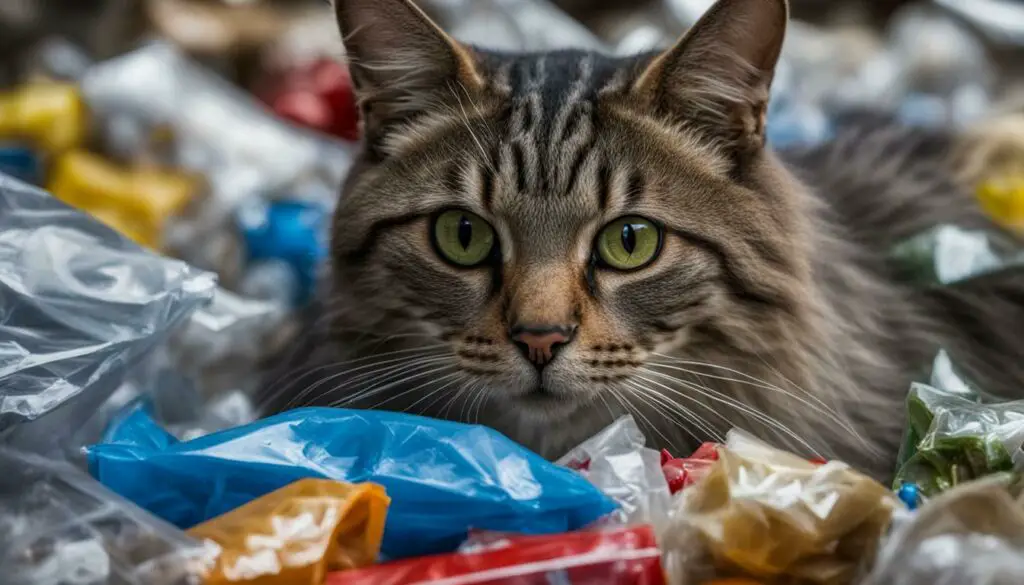
It is important for cat owners to be aware of these risks and take necessary precautions to prevent their cats from ingesting plastic. This includes keeping plastic materials securely stored away, using pet-friendly alternatives, and supervising playtime to ensure the cat does not have access to plastic objects. Regular veterinary check-ups can also help identify any potential blockages or health issues caused by plastic consumption, allowing for early intervention and treatment.
By understanding the risks associated with plastic consumption, cat owners can take proactive measures to protect their pets and maintain their overall well-being. Ensuring a safe environment and promoting healthy habits will help prevent incidents of plastic ingestion and safeguard the health of our feline companions.
Signs that Your Cat Has Eaten Plastic
It’s important to be aware of the signs that your cat may have ingested plastic, including vomiting, altered stools, decreased appetite, lethargy, and abdominal pain. These symptoms can indicate that your cat has consumed plastic and may be experiencing gastrointestinal issues as a result. If you notice any of these signs, it’s crucial to take immediate action to prevent further complications.
In addition to these common signs, you may also observe your cat coughing or gagging, pawing at their mouth, or having difficulty swallowing. These behaviors could indicate that a piece of plastic is stuck in their throat or causing discomfort. It’s essential to pay close attention to your cat’s behavior and contact a veterinarian if you suspect plastic ingestion.
While these signs may indicate that your cat has eaten plastic, it’s important to note that they can also be symptoms of other health issues. Therefore, it’s crucial to consult with a veterinarian for a proper diagnosis and appropriate treatment.
Table: Symptoms of Plastic Ingestion in Cats
| Common Symptoms | Additional Signs |
|---|---|
| Vomiting | Coughing or gagging |
| Altered stools | Pawing at mouth |
| Decreased appetite | Difficulty swallowing |
| Lethargy | – |
| Abdominal pain | – |
Note: If you suspect that your cat has consumed plastic or is showing any of these symptoms, it’s important to seek veterinary care as soon as possible. Prompt action can help prevent further complications and ensure your cat’s well-being.
Immediate Steps to Take if Your Cat Eats Plastic Wrapper
If your cat has ingested a plastic wrapper, there are immediate steps you can take to help them. It is important to act quickly to prevent further complications and ensure your cat’s well-being. Here are the steps you should follow:
- Prevent further consumption: If you catch your cat in the act of eating a plastic wrapper, try to safely remove it from their mouth. Be careful not to get bitten or hurt in the process. If the wrapper is already swallowed, proceed to the next step.
- Observe and monitor: Keep a close eye on your cat for any signs of distress or discomfort. Monitor their behavior, appetite, and bowel movements. If you notice any unusual symptoms or if your cat’s condition worsens, seek veterinary attention immediately.
- Contact a veterinarian: It is crucial to contact your veterinarian as soon as possible. They will provide guidance based on the size and type of plastic ingested. The vet may recommend bringing your cat in for an examination to assess the situation and determine the best course of action.
Remember, every situation is unique, and professional advice is essential to ensure the health and safety of your cat. Taking prompt action and seeking veterinary care can minimize the potential risks associated with plastic ingestion and increase the chances of a positive outcome for your furry friend.
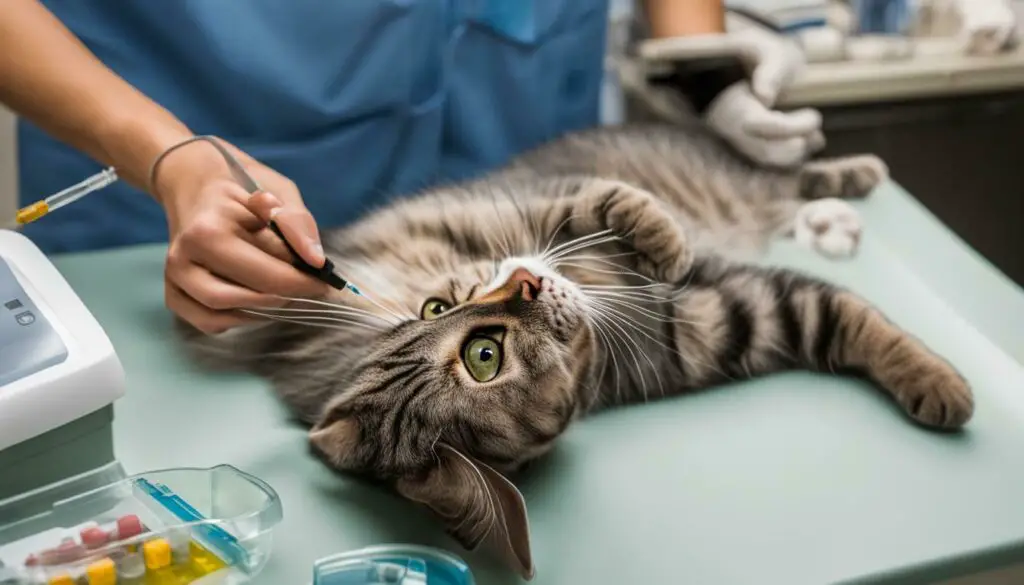
Table 1: Potential Symptoms of Plastic Ingestion in Cats
| Common Symptoms | Less Common Symptoms |
|---|---|
|
|
Keep in mind that the presence of these symptoms does not necessarily mean that your cat has ingested plastic. However, if you notice any of these signs after your cat has had access to plastic, it is important to consult with a veterinarian for a proper diagnosis and appropriate treatment.
By taking immediate steps and seeking professional care, you can help your cat who has eaten a plastic wrapper and minimize the potential risks associated with plastic ingestion. Remember, the well-being of your feline companion is a top priority, and timely action is vital in ensuring their health.
The Importance of Veterinary Examination
It’s crucial to have your cat examined by a veterinarian to assess any potential damage to organs after eating plastic. Cats may experience various health issues when they consume plastic, including gastrointestinal blockages, suffocation, and strangling risks. Immediate action is necessary to ensure the well-being of your feline friend.
During the veterinary examination, the veterinarian will conduct a thorough physical examination of your cat to check for any signs of distress or discomfort. They may also order diagnostic tests such as X-rays or ultrasounds to determine if there are any blockages or foreign objects present in your cat’s digestive system.
Early detection and intervention are crucial when it comes to plastic ingestion in cats. If left untreated, the ingested plastic can cause serious complications and even be life-threatening. The veterinarian will be able to recommend the appropriate treatment options based on the size and type of plastic consumed, as well as the overall health of your cat.
Remember, as a cat owner, you play a vital role in ensuring the well-being of your pet. If you suspect that your cat has eaten plastic or notice any symptoms such as vomiting, altered stools, decreased appetite, lethargy, or abdominal pain, don’t hesitate to seek veterinary care immediately. Acting promptly can help prevent further complications and provide the best possible outcome for your cat.
Reference:
“It’s crucial to have your cat examined by a veterinarian to assess any potential damage to organs after eating plastic.”
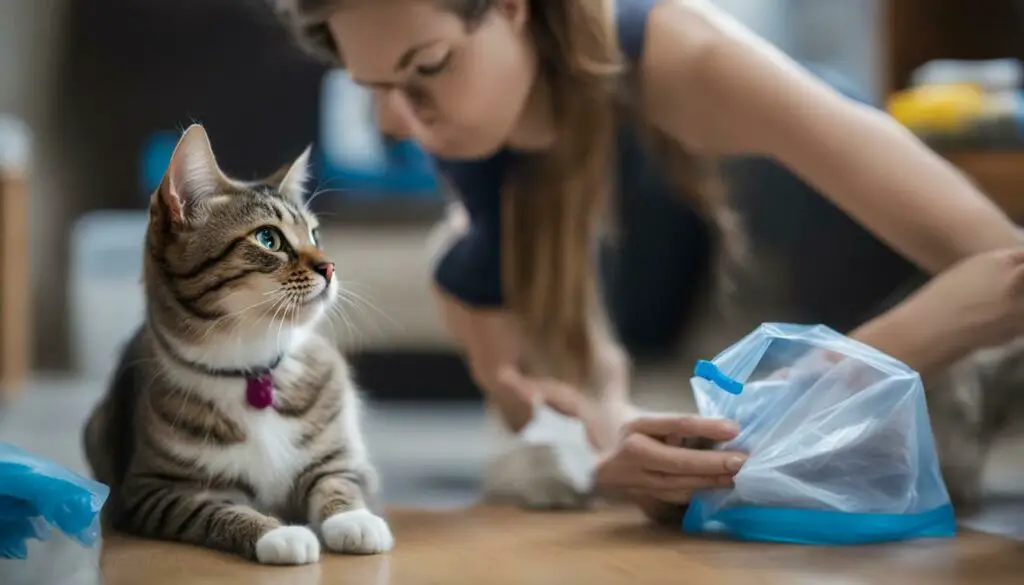
| Common Symptoms of Plastic Ingestion in Cats |
|---|
| Vomiting |
| Altered stools |
| Decreased appetite |
| Lethargy |
| Abdominal pain |
- Seek immediate veterinary care if you suspect your cat has eaten plastic.
- Prevent further consumption of plastic by removing any potential sources from your cat’s environment.
- Observe and monitor your cat’s behavior and symptoms closely.
- Do not induce vomiting without consulting a veterinarian first.
Determining the Outcome for a Cat That Ate Plastic
The ultimate outcome for a cat that has ingested plastic depends on factors such as the size and type of plastic involved, making prompt vet care essential. When a cat eats plastic, it can lead to various health risks, including suffocation, strangling hazards, and gastrointestinal blockages. These dangers arise due to the inability of cats to digest plastic properly.
Signs that your cat has eaten plastic may include vomiting, altered stools, decreased appetite, lethargy, and abdominal pain. If you suspect that your cat has ingested plastic, it is crucial to take immediate action. Prevent further consumption by removing any plastic materials within your cat’s reach. Observe and monitor your cat’s behavior closely. If any symptoms persist or worsen, it is vital to contact a veterinarian right away.
A veterinary examination is necessary to assess the situation and determine if any damage has occurred to your cat’s organs. The vet will conduct a thorough examination, potentially including X-rays or ultrasounds to identify the presence of any blockages or obstructions caused by the plastic ingestion. Prompt vet care can greatly improve the chances of a positive outcome for your cat.
Choking hazards, intestinal blockages, and potential toxicity are serious risks associated with cats ingesting plastic. By seeking immediate veterinary care, you can ensure that your cat receives the necessary treatment to alleviate these risks and prevent further complications.
| Type of Plastic | Potential Outcome |
|---|---|
| Small, Soft Plastic Objects | May pass through the digestive system without causing significant harm. |
| Large or Sharp Plastic Objects | Pose a higher risk for intestinal blockages or organ damage. |
| Toxic Plastic or Chemicals | Can lead to poisoning, organ failure, or other severe health complications. |
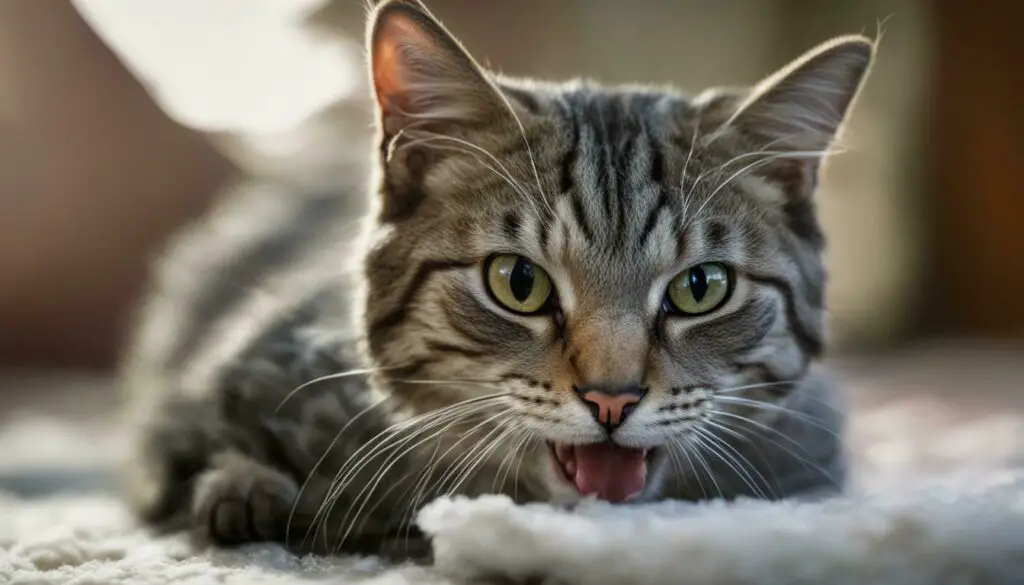
When it comes to preventing future incidents, it is crucial to store plastics safely, keeping them out of your cat’s reach. Be mindful of any household items or packaging materials that may pose a risk, such as plastic bags, plastic wrap, or small toy parts. Providing your cat with appropriate toys and plenty of playtime can also help redirect their attention away from potentially harmful materials.
Furthermore, it is recommended to have your cat’s liver and kidneys checked for potential toxicity. Ingesting plastic may expose your cat to harmful substances that can affect these vital organs. Regular check-ups and monitoring of your cat’s health can help detect any potential issues early on and allow for prompt intervention.
Preventing Future Incidents of Plastic Ingestion
To avoid future episodes of plastic ingestion, it’s important to take preventive measures and provide appropriate alternatives for your cat. Here are some practical steps you can take to keep your feline companion safe:
- Store plastics safely: Keep all plastic bags, wrappers, and packaging securely stored away in cabinets or drawers where your cat can’t access them. Consider using airtight containers for food and other items that come in plastic packaging.
- Offer suitable alternatives: Cats often chew on plastic out of boredom or curiosity. To discourage this behavior, provide your cat with plenty of toys and interactive playtime to keep them mentally stimulated. Additionally, consider using puzzle feeders or treat-dispensing toys to provide mental and physical stimulation while reducing the urge to chew on plastic.
- Create a cat-friendly environment: Ensure that your cat’s environment is enriching and engaging. Provide scratching posts, climbing trees, and cozy hiding spots to satisfy their natural instincts. A happy and mentally stimulated cat is less likely to resort to chewing on plastic.
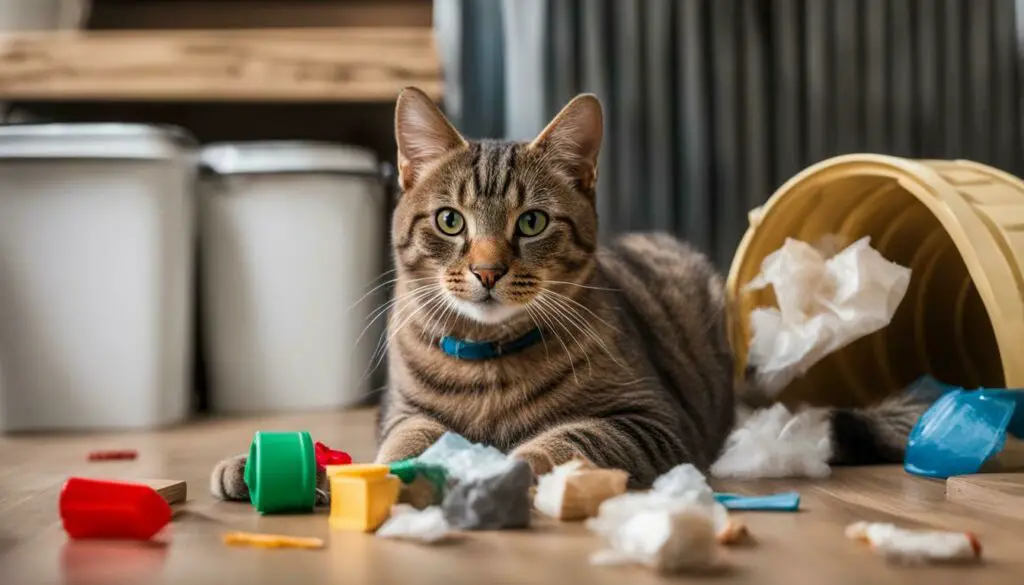
By implementing these preventive measures, you can significantly reduce the risk of your cat ingesting plastic and encountering potential health issues. Remember, it’s essential to create a safe environment for your feline friend and provide them with appropriate alternatives to satisfy their natural instincts and prevent destructive behaviors.
Summary:
| Preventive Measures | Benefits |
|---|---|
| Store plastics safely | Prevents access to plastic bags and packaging |
| Offer suitable alternatives | Reduces boredom and curbs the urge to chew on plastic |
| Create a cat-friendly environment | Provides mental stimulation and outlets for natural behaviors |
“Taking proactive steps to prevent your cat from ingesting plastic is crucial for their well-being. By implementing these preventive measures, you are ensuring a safer and healthier environment for your beloved feline companion.”
Checking for Potential Toxins in the Cat’s System
To ensure your cat’s health, it’s recommended to have their liver and kidneys checked for potential toxins after ingesting plastic. Plastic ingestion poses risks of various harmful chemicals or substances that may have been present in or on the plastic material. The liver and kidneys are responsible for filtering toxins from the body, and they can be affected if the cat has ingested any harmful substances along with the plastic. A comprehensive examination will help determine if there are any signs of toxicity and allow the veterinarian to prescribe the appropriate treatment.
| Potential Toxins | Symptoms |
|---|---|
| Chemicals in plastic | Organ dysfunction, vomiting, diarrhea |
| Residue from packaging | Loss of appetite, lethargy |
| Ingested substances on plastic surface | Excessive salivation, tremors, seizures |
During the veterinary examination, it is important to provide detailed information about the type of plastic ingested, the potential sources of the plastic, and any other relevant details. This will assist the veterinarian in diagnosing any potential toxins and offering the most appropriate treatment for your cat’s specific situation. Remember, the liver and kidneys play vital roles in maintaining a cat’s overall health, so prompt action and regular check-ups are essential to ensure their well-being.
Quote:
“Regular check-ups and tests can help identify any potential toxins that may have affected the liver and kidneys, allowing for early detection and treatment.” – Dr. Jane Smith, Veterinarian
By being proactive and taking the necessary precautions, such as keeping plastics out of your cat’s reach and providing safe alternatives for chewing and play, you can minimize the risk of plastic ingestion and potential exposure to harmful substances. Additionally, maintaining a clean and tidy environment helps prevent accidental ingestion of plastic remnants or packaging materials. Always prioritize your cat’s safety by creating a cat-friendly environment and seeking immediate veterinary care if you suspect plastic ingestion or toxic exposure.
Understanding the Risks of Plastic Wrap for Cats
Plastic wrap poses specific risks for cats, as it cannot be digested and may lead to blockages. When a cat ingests plastic wrap, it puts their health at serious risk. Choking hazards, intestinal blockages, and potential toxicity are the dangers that cats face when consuming plastic. It is crucial for cat owners to be aware of these risks and take immediate action if their feline friend ingests plastic wrap.
Signs that a cat has eaten plastic can vary, but common indicators include vomiting, altered stools, decreased appetite, lethargy, and abdominal pain. If you suspect that your cat has ingested plastic wrap, it is essential to act promptly. Prevent further consumption by removing any remaining plastic from their reach and closely monitor their behavior and condition.
Plastic wrap can be a serious hazard for cats, and pet owners must respond quickly to ensure their well-being,” advises Dr. Emily Thompson, a veterinarian specializing in feline health.
“When a cat ingests plastic, it can lead to choking, blockages in their digestive system, and even potential toxicity if they come into contact with harmful substances along with the plastic. Contacting a veterinarian is crucial to assess the situation and determine the best course of action.”
If your cat has consumed plastic wrap, seeking veterinary care is of utmost importance. A veterinarian can examine your cat to assess whether any damage has occurred and provide appropriate treatment. In some cases, surgery may be necessary to remove the blockage caused by the ingested plastic.
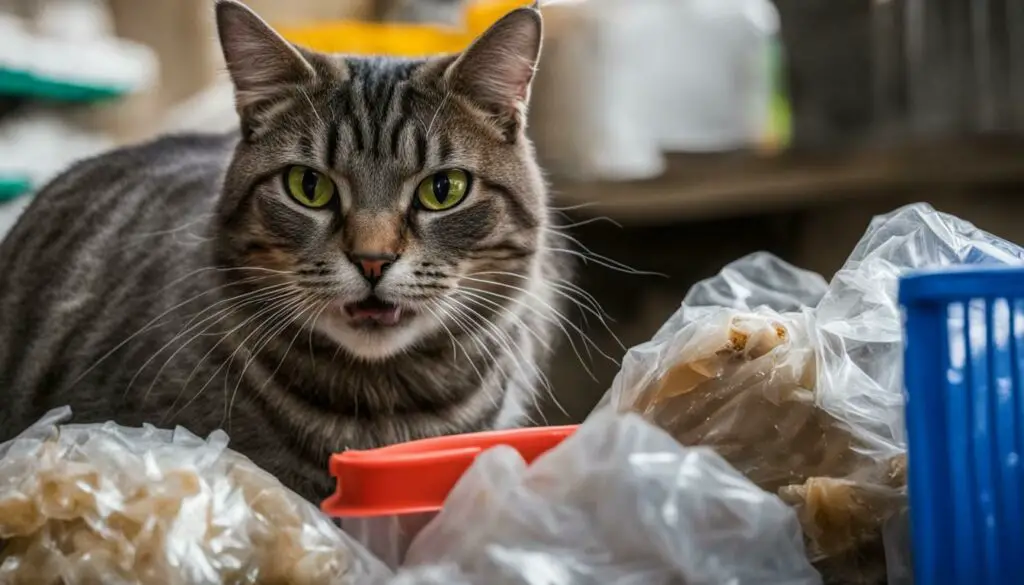
| Risks of Plastic Wrap for Cats | Immediate Steps to Take |
|---|---|
| Potential choking hazards | Prevent further consumption |
| Intestinal blockages | Observe and monitor the situation |
| Potential toxicity from harmful substances | Contact a veterinarian |
Potential Health Issues Caused by Plastic Consumption
Plastic consumption by cats can result in various health issues, such as diarrhea, vomiting, and gastrointestinal blockages. When a cat ingests plastic, it can cause irritation and inflammation in the digestive system, leading to these uncomfortable and potentially dangerous symptoms. The plastic material can disrupt the normal flow of food and waste through the intestine, leading to blockages that may require surgical intervention to remove.
In some cases, plastic consumption can also lead to choking hazards and respiratory issues. Cats may accidentally inhale or swallow small plastic pieces, posing a risk of suffocation or respiratory distress. Additionally, certain plastics may contain toxic substances that can be harmful when ingested by cats, potentially affecting the liver and kidneys. It is crucial to seek prompt veterinary care if you suspect your cat has consumed plastic to prevent any further complications.
To prevent plastic consumption and the associated health risks, it is essential to keep all plastic materials out of your cat’s reach. Store plastics securely in cabinets or drawers, and avoid leaving plastic bags, wrappers, or small toys where your cat can access them. Providing your cat with appropriate toys, scratching posts, and regular playtime can help redirect their chewing behavior away from plastic objects.
| Health Issues Caused by Plastic Consumption: |
|---|
| Diarrhea |
| Vomiting |
| Gastrointestinal blockages |
| Choking hazards |
| Respiratory issues |
| Potential toxicity |
Remember, the health and safety of your furry friend should always be a top priority. If you suspect your cat has consumed plastic or is experiencing any concerning symptoms, do not hesitate to contact your veterinarian for guidance and proper care.
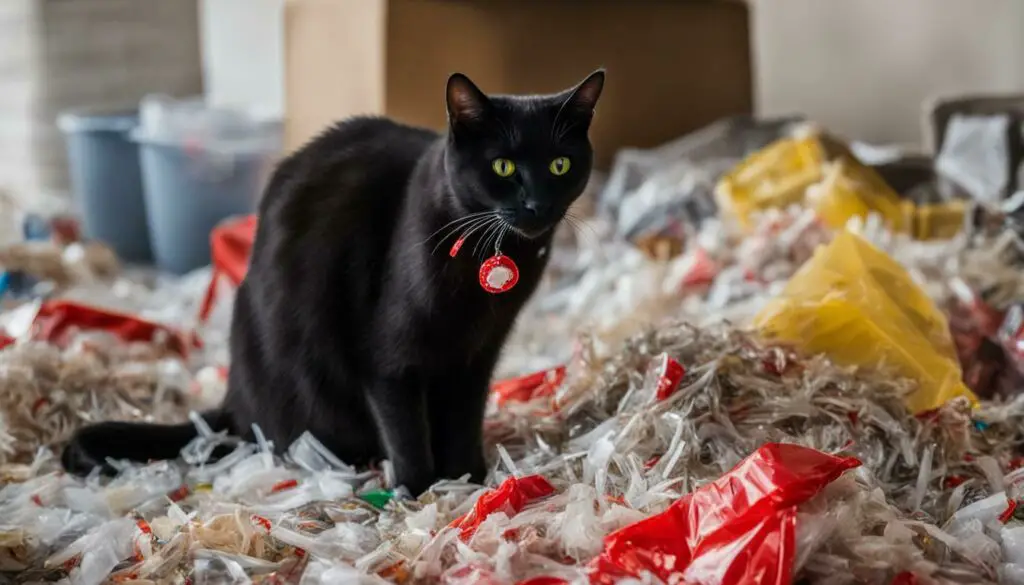
Monitoring and Observing Your Cat’s Condition
After your cat has ingested plastic, it’s crucial to closely monitor and observe their condition for any changes or complications. Plastic ingestion can lead to various health issues, including gastrointestinal blockages, diarrhea, and vomiting. By keeping a watchful eye on your cat, you can detect any signs of discomfort or distress and take appropriate action.
One way to monitor your cat’s condition is by observing their behavior. Look for any changes in appetite, as a decrease in food intake can indicate digestive issues. Additionally, pay attention to their litter box habits and note any changes in stool consistency or frequency. Any signs of constipation or straining during defecation may be indicative of a gastrointestinal blockage caused by the plastic.
If you suspect that your cat has eaten plastic, be mindful of their activity level. Lethargy or a decrease in energy could be a sign of internal discomfort. Keep an eye out for any abdominal pain, which may manifest as restlessness or an arched back. Vomiting is also common when a cat ingests plastic, so monitor for any episodes of regurgitation or retching.
| Signs to Monitor For: | Actions to Take: |
|---|---|
| Vomiting | Monitor frequency and consistency of vomit. Contact a veterinarian if vomiting persists or if your cat appears distressed. |
| Altered Stools | Observe any changes in stool consistency, color, or frequency. If you notice signs of constipation or difficulty defecating, seek veterinary care. |
| Decreased Appetite | Monitor your cat’s food intake and consult a veterinarian if they refuse to eat for an extended period. |
| Lethargy | Watch for any decrease in energy levels or signs of weakness. If your cat appears unusually tired and inactive, seek veterinary advice. |
| Abdominal Pain | Look for signs of discomfort, such as restlessness, arched back, or sensitivity when touched. Consult a veterinarian if you suspect abdominal pain. |
Remember, immediate veterinary care is essential if you notice any severe symptoms or if your cat’s condition worsens. Your veterinarian can provide a comprehensive evaluation and recommend appropriate treatment options to ensure your cat’s well-being and recovery.
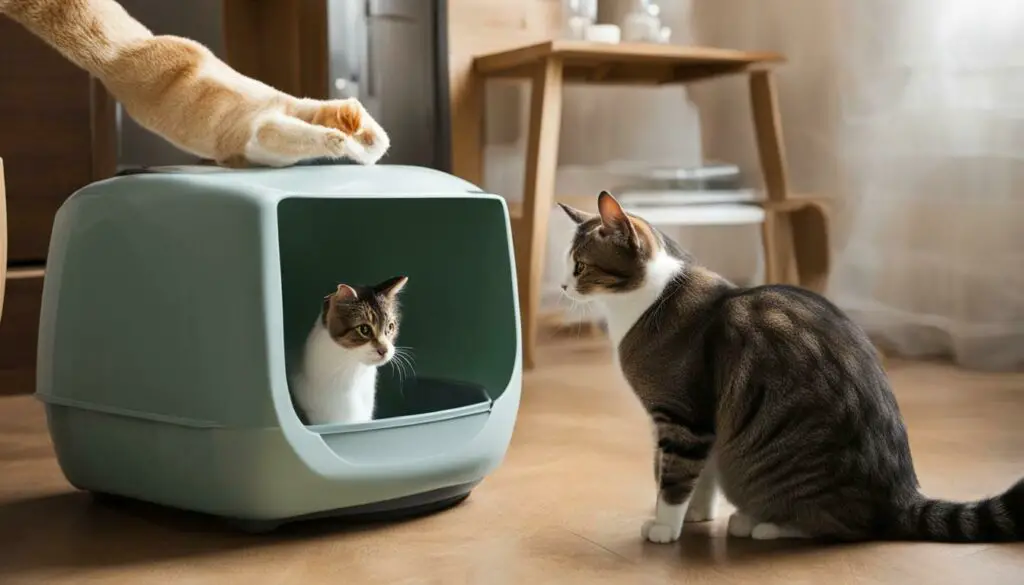
The Role of Prompt Veterinary Care
If your cat has ingested plastic, prompt veterinary care is vital for their well-being and recovery. Plastic ingestion can pose various risks to your feline friend, including suffocation, strangling risks, and gastrointestinal blockages. Ingested plastic can lead to serious health issues such as diarrhea and vomiting. It is crucial to seek immediate veterinary attention to assess the situation and provide appropriate treatment.
During a veterinary examination, your cat will be thoroughly evaluated to determine if any damage has occurred to their organs. The veterinarian will conduct physical examinations, X-rays, or ultrasound scans to identify potential blockages or abnormalities. Additionally, they may perform blood tests to check for signs of organ damage or toxicity.
Based on the size and type of plastic consumed, the outcome for a cat that has ingested plastic can vary. If the plastic has caused an obstruction, surgical intervention may be necessary to remove the blockage. In some cases, the cat may require supportive care, such as intravenous fluids and medications, to alleviate symptoms and aid in recovery.
| Possible Risks of Plastic Ingestion in Cats: | Signs of Plastic Ingestion in Cats: |
|---|---|
|
|
Preventing future incidents of plastic ingestion is crucial for your cat’s well-being. Ensure that all plastics are stored safely away from your curious feline companion. Opt for cat-friendly toys and interactive playtime to keep them engaged and reduce the likelihood of them seeking out potentially harmful objects.
Remember, the ingestion of plastic can be a serious medical emergency. If you suspect that your cat has eaten plastic, do not hesitate to contact your veterinarian immediately. The sooner your cat receives appropriate treatment, the higher the chances of a successful recovery.
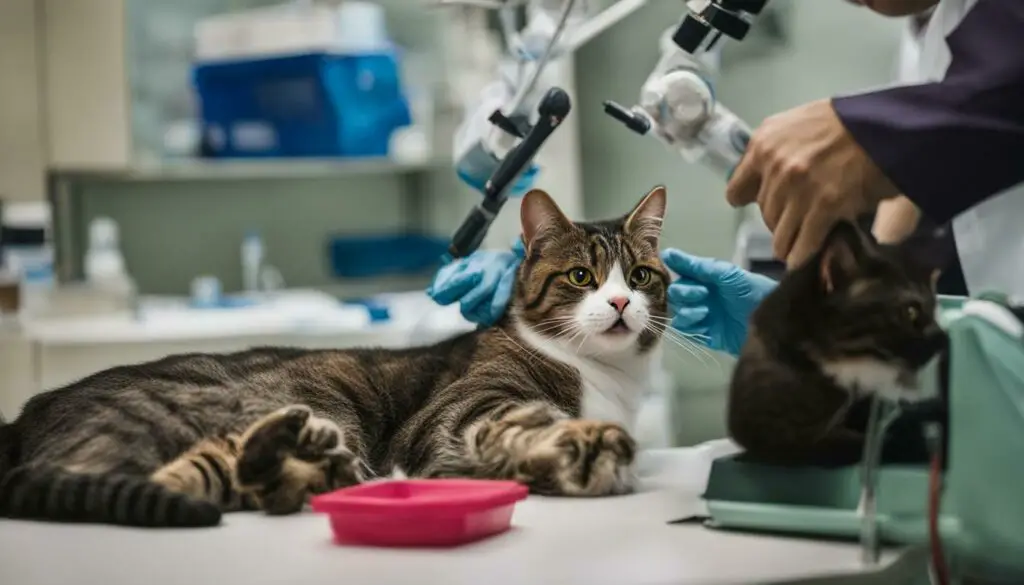
Conclusion
In conclusion, when a cat eats plastic, it’s essential to take immediate action to safeguard their health and well-being. Plastic ingestion in cats can lead to various dangers, including suffocation, strangling risks, and gastrointestinal blockages. It can also result in symptoms such as diarrhea, vomiting, altered stools, decreased appetite, lethargy, and abdominal pain. Therefore, it is crucial to be vigilant and recognize the signs that indicate your cat has eaten plastic.
If your cat has ingested plastic, there are immediate steps you can take to help them. It is important to prevent further consumption by removing any plastic remnants and securing plastic items in your home. Additionally, closely observe and monitor your cat’s condition, looking out for any changes or worsening symptoms. It is advisable to seek veterinary care promptly, as a professional examination is vital to ensure no internal organ damage has occurred.
Preventing future incidents of plastic ingestion is key to keeping your cat safe. Store plastics safely and out of your cat’s reach, and provide them with plenty of toys and playtime to prevent boredom and curiosity leading to plastic consumption. It is also recommended to have your cat’s liver and kidneys checked for potential toxicity, as there may be harmful substances associated with the plastic ingestion.
In summary, being aware of the dangers of a cat eating plastic, recognizing the signs of plastic ingestion, and taking immediate action are essential for your cat’s well-being. By implementing preventive measures and seeking prompt veterinary care, you can help ensure the best possible outcome for your furry friend.
FAQ
What are the potential health concerns when a cat eats plastic?
When a cat eats plastic, it can lead to suffocation, strangling risks, gastrointestinal blockages, diarrhea, and vomiting.
Is it safe for cats to eat plastic wrap?
No, it is not safe for cats to eat plastic wrap as it can’t be digested and may cause blockages.
What are the dangers of cats ingesting plastic?
The dangers of cats ingesting plastic include choking hazards, intestinal blockages, and potential toxicity.
What are the signs that a cat has eaten plastic?
Signs that a cat has eaten plastic may include vomiting, altered stools, decreased appetite, lethargy, and abdominal pain.
What immediate steps should I take if my cat eats a plastic wrapper?
If your cat eats a plastic wrapper, you should prevent further consumption, observe and monitor the situation, and contact a veterinarian.
Why is it important to have my cat examined by a veterinarian after consuming plastic?
It is important to have your cat examined by a veterinarian to ensure no damage to organs has occurred.
What is the outcome for a cat that has eaten plastic?
The outcome for a cat that has eaten plastic depends on the size and type of plastic consumed, and prompt vet care is important.
How can I prevent future incidents of plastic ingestion in my cat?
You can prevent future incidents by keeping plastics stored safely and providing your cat with toys and playtime.
Should I have my cat’s liver and kidneys checked for potential toxicity if they ate plastic?
Yes, it is recommended to have the cat’s liver and kidneys checked for potential toxicity.
Source Links